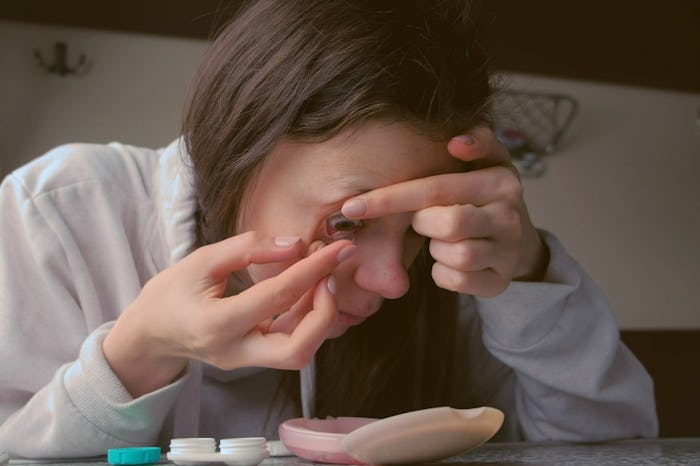Life

6 Surprising Things That Happen To Your Eyes When You Wear Contacts
I started wearing contacts in the fifth grade, and for one reason: I had discovered this incredible (read: awful) silver eyeshadow from CVS, and I couldn't bare to have my glasses cramp my metallic style. Almost 20 years later, I'm still wearing contact lenses daily. While I can't deny how convenient they are, I sometimes wonder if they have any longterm effects. What happens to your eyes when you wear contacts? Can touching your eyes daily affect them? How about covering them up?
Putting contact lenses in feels a little... freaky the first few times. After all, there is really nothing natural about basically putting a clear raincoat on your eyeball for the majority of the hours you're awake. However, you quickly become a pro, and wearing them becomes second nature. (I now pride myself on being able to insert contacts without a mirror.) But I'm also the first to admit that with this increased comfort and convenience came a decrease in attention to the contact-lens-wearing "rules" my original optometrist gave me as a fifth grader, and I'm certain I'm not alone. Brushing up on the mechanics, science, and potential risks of wearing contacts is a useful reminder of the importance of eye care, especially if you depend on them daily.
1Your tears keep your contact lenses clean.
The contacts stay in place thanks to eyelid pressure, and stay clean thanks to natural mechanisms. "A properly fit contact moves just enough, and allows tears to be pumped in and out of the area below the contact and above the ocular surface. This helps to ensure the ocular surface remains healthy," Justin Bazan, Doctor of Optometry with Think About Your Eyes, tells Romper.
Related, if you notice that your eyes are dryer, due to anything from staring at your computer too long or being in a smoky, dry area, you may notice that your contacts aren't functioning as well or wearing as comfortably as they typically do.
2Your eyes don't actually touch the contacts.
Probably everyone would be surprised to learn that your contacts aren't actually attached to the surface of your eyeball. Rather, there's a layer of fluid in between. "Contact lenses stay in place by sticking to the layer of tear fluid that floats on the surface of the eye," explained HowStuffWorks. Which means...
3Your eye, more or less, gets a tracking device.
Though your contact lens doesn't actually attach to your eye, it glides effortlessly with said eye as the eye moves. Soft contact lenses manufacturer CooperVision explained, "Since the lenses stick to the tear fluid on your eye surface, they move naturally with you."
4You register light differently.
The world is a scary place for me until I put my glasses on or contacts in each day. Unless you've got terrible vision, you don't know how amazing it feels to go from a complete blur to 20/20 vision in a matter of seconds. But how do they do this exactly?
Once in place, your contact lenses actually work just like traditional glasses: by altering the direction of light coming into your eye and focusing it properly on your retina, according to AllAboutVision.com. They don't change anything about your actual eye, but rather the light entering it.
5Your eyes get less oxygen.
Just as your contact lenses change how light enters your eyes, it also changes how oxygen enters your eyes. Simply put, it greatly reduces the amount your eyes actually receive. "Your cornea is one of the only places in your body that doesn’t get its much-needed oxygen from blood vessels. It gets it from the air instead," explained Cascadia Eye, a Washington-based chain of eye clinics. "When you wear soft contact lenses, a limited amount of oxygen gets to your eye, which is fine until you close those eyes for prolonged periods of time."
In other words, it's crucial to remove your contact lenses prior to sleeping (even napping!) to avoid starving your eyes of oxygen. I know how difficult it can be to force yourself out of bed or off the couch to take out your contacts, but is your vision really something you want to gamble with?
And as crucial as it is to be careful inserting your contacts, removing them is also a gamble. "Proper removal shouldn't result in any irritation or damage," Dr. Bazan tells Romper. "However if a person removes it with too much force, there can be damage to the ocular surface. Sometimes its just a minor irritation and sometimes it can be worse as in an abrasion."
If you choose to wear contact lenses, it's imperative you care for them properly. Follow all of the instructions from your doctor and contact lens provider, and pay attention to any changes to your eyes and vision. "Follow the look, see and feel good rule. If you eyes aren't looking white and healthy, seeing clearly and feeling good, give them a break from the contacts. If symptoms persist for more than an hour, contact your eye doctor immediately," advises Dr. Bazan.